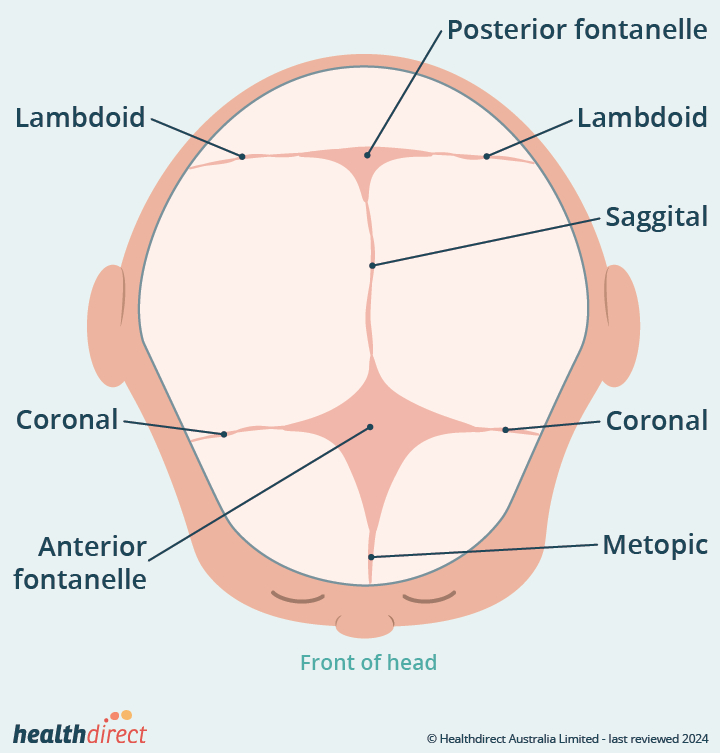
Craniosynostosis is a congenital condition in which the sutures in a baby’s skull fuse prematurely, restricting normal skull growth and potentially affecting brain development. The skull is made up of several bones joined by flexible sutures that allow for growth of the brain during infancy and early childhood. When one or more of these sutures close too early, the skull can become misshapen, and the growing brain may be constrained, leading to potential developmental issues.
Understanding Craniosynostosis:
Craniosynostosis is a condition present at birth where one or more of the sutures in a baby’s skull fuse prematurely. Sutures are the flexible, fibrous joints between the bones of the skull. These joints are crucial for accommodating the rapid growth of the brain during infancy and early childhood. Normally, these sutures remain open to allow for this growth, gradually closing as the child matures. However, in craniosynostosis, the early closure of these sutures restricts the natural expansion of the skull, leading to an abnormal head shape and potential complications in brain development.
Treatment and Management:
The primary treatment for craniosynostosis is surgical intervention, which aims to correct the skull’s shape and alleviate any pressure on the brain. Key aspects of treatment include:
Surgical Correction: The surgery, often performed within the first year of life, involves removing the fused sutures and reshaping the skull. The specific approach depends on the type of craniosynostosis and the child’s overall health. Advanced techniques may be used to minimize the need for multiple surgeries and to promote optimal skull growth.
Postoperative Care: After surgery, the child will require close monitoring and follow-up care to ensure proper healing and development. This may involve regular check-ups with a craniofacial specialist, physical therapy, and developmental assessments to support overall growth and recovery.
Supportive Therapies: In addition to surgical treatment, children with craniosynostosis may benefit from therapies aimed at addressing developmental delays, including speech, occupational, and physical therapy.
Long-Term Outlook:
With timely intervention, many children with craniosynostosis can achieve a normal or near-normal head shape and healthy brain development. Early diagnosis and treatment are crucial to minimizing long-term effects and ensuring the best possible outcomes. Ongoing care and support play an important role in helping children adapt and thrive as they grow.
Expert Care:
For comprehensive evaluation and treatment of craniosynostosis, consulting with a specialized healthcare provider is essential. Dr. Amit Deora, a renowned neurosurgeon in Indore, offers expert care for craniosynostosis and other craniofacial conditions. His expertise, along with a multidisciplinary team approach, ensures that children receive the best possible treatment tailored to their specific needs, promoting optimal recovery and development.

Craniosynostosis is a congenital disorder characterized by the premature fusion of one or more of the sutures in a baby’s skull. The skull consists of several bones connected by flexible joints called sutures, which allow the skull to expand as the brain grows during infancy and early childhood. These sutures typically remain open to accommodate the rapid growth of the brain, eventually closing as the child matures.
In craniosynostosis, the early closure of these sutures restricts the normal growth of the skull, leading to an abnormal head shape and potentially affecting brain development. This condition can result in a range of physical and developmental issues, depending on which sutures are involved and the severity of the fusion.
1. Coronal Craniosynostosis:
2. Sagittal Craniosynostosis:
3. Metopic Craniosynostosis:
4. Lambdoid Craniosynostosis:
Each type of craniosynostosis affects the skull’s shape differently, depending on which sutures are involved. Early diagnosis and treatment are essential to address these abnormalities and support normal brain development.
The Symptoms of Craniosynostosis can vary depending on the specific type of sutural fusion and the severity of the condition. Early recognition of these symptoms is crucial for effective diagnosis and treatment. Here is a more detailed look at the common signs and symptoms associated with craniosynostosis:
1. Abnormal Head Shape:
2. Visible Ridge Along the Sutures:
3. Developmental Delays:
4. Eye and Ear Alignment Issues:
5. Increased Intracranial Pressure:
6. Difficulty in Head Movement:
7. Unusual Facial Features:
If any of these symptoms are observed, it is important to seek medical evaluation promptly. Early diagnosis and treatment are vital to prevent complications and ensure proper development. Pediatricians and specialists can perform the necessary assessments, including physical examinations and imaging studies, to diagnose craniosynostosis and determine the appropriate course of action.
Expert Care
For specialized evaluation and treatment, consulting with a skilled healthcare provider is crucial. Dr. Amit Deora, a leading neurosurgeon in Indore, offers expert care for craniosynostosis and other craniofacial conditions. With his experience and advanced surgical techniques, he provides comprehensive treatment to address craniosynostosis effectively, improving outcomes and quality of life for affected children.
Craniosynostosis is a complex congenital condition that requires timely diagnosis and intervention to ensure optimal outcomes for affected children. The early fusion of cranial sutures can lead to a range of symptoms, including abnormal head shapes, developmental delays, and alignment issues, all of which can impact a child’s growth and overall well-being. Recognizing these symptoms early and seeking appropriate medical care are crucial for managing the condition effectively.
For comprehensive evaluation and treatment of craniosynostosis, consulting with a specialized healthcare provider is essential. Dr. Amit Deora, a leading neurosurgeon in Indore, offers expert care for craniosynostosis and other craniofacial conditions. His extensive experience and advanced surgical techniques ensure that children receive the best possible treatment tailored to their specific needs. Additionally, for ongoing care and support, neurologists in Indore, such as Dr. Amit Deora, provide valuable insights and management strategies to support the child’s development and recovery. With the right medical guidance and intervention, children with craniosynostosis can achieve significant improvements in head shape and overall health, leading to a better quality of life.